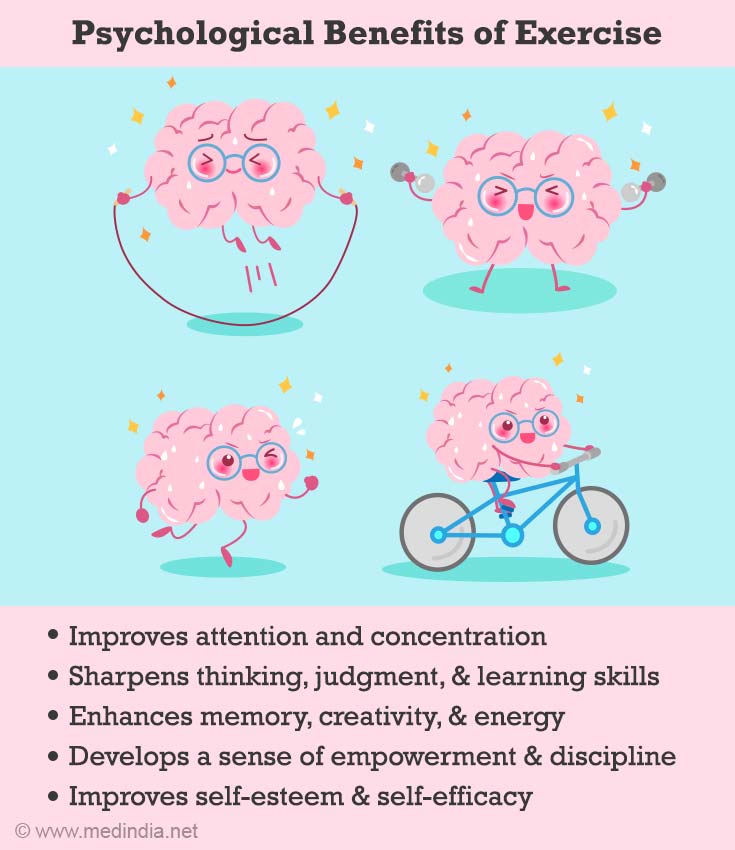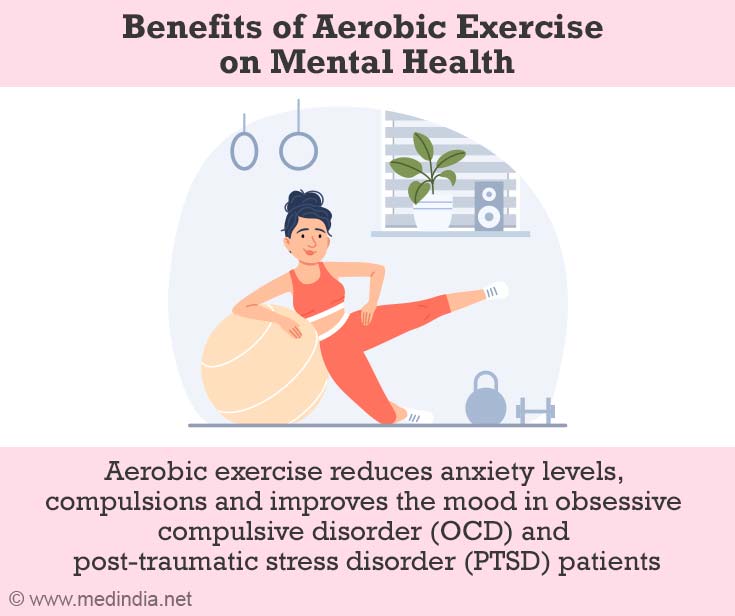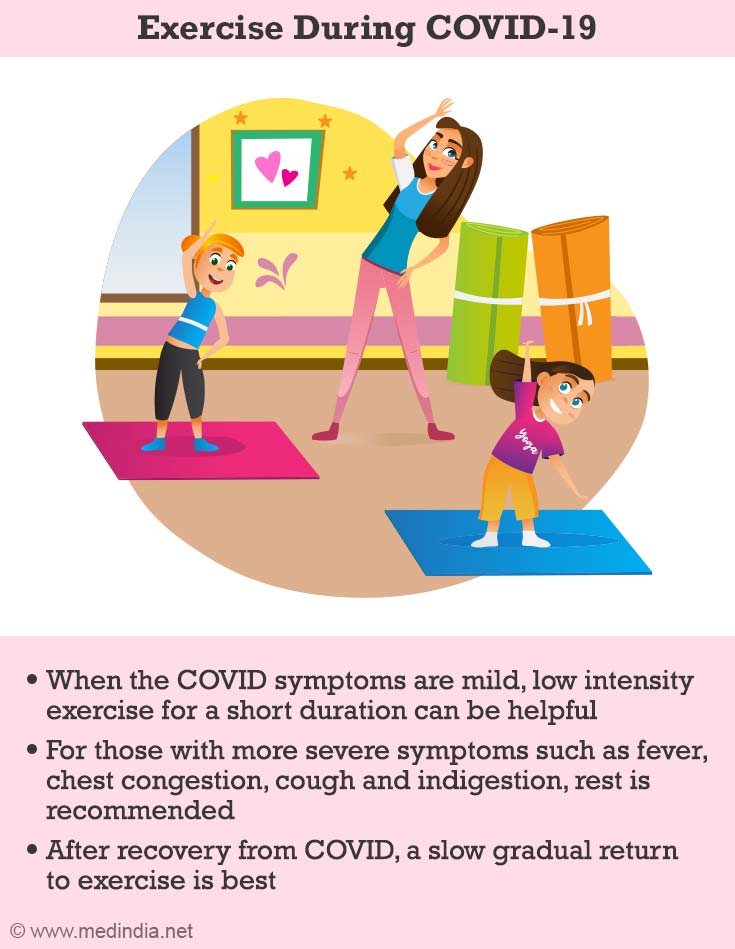- The impact of exercise on the mental health and quality of life of people with severe mental illness: a critical review - (https://researchonline.jcu.edu.au/20027/4/31837_Law_etal_2014_AcceptedVersion.pdf)
- The Link Between Exercise and Mental Health - (https://connect.uclahealth.org/2018/10/17/the-link-between-exercise-and-mental-health/)
- Exercise and mental health - (https://www.healthdirect.gov.au/exercise-and-mental-health)
- Benefits of exercise - (https://www.nhs.uk/live-well/exercise/exercise-health-benefits/)
- Benefits of Physical Activity - (https://www.cdc.gov/physicalactivity/basics/pa-health/index.htm)
- The Risks of Exercise: Too Little and Too Much May Affect Psychological Health - (https://www.mhanational.org/blog/risks-exercise-too-little-and-too-much-may-affect-psychological-health)
- Psychological Benefits of Exercise - (https://appliedsportpsych.org/resources/health-fitness-resources/psychological-benefits-of-exercise/)
- 5 Mental Benefits of Exercise - (https://www.waldenu.edu/online-bachelors-programs/bs-in-psychology/resource/five-mental-benefits-of-exercise)
- Can exercise help treat anxiety? - (https://www.health.harvard.edu/blog/can-exercise-help-treat-anxiety-2019102418096)
- Norepinephrine - (https://www.hormone.org/your-health-and-hormones/glands-and-hormones-a-to-z/hormones/norepinephrine#:~:text=Bursts%20of%20norepinephrine%20can%20lead,ADHD)
- Acute effects of aerobic exercise on negative affect and obsessions and compulsions in individuals with obsessive-compulsive disorder - (https://pubmed.ncbi.nlm.nih.gov/30699885/)
- Exercise Intervention in PTSD: A Narrative Review and Rationale for Implementation - (https://www.frontiersin.org/articles/10.3389/fpsyt.2019.00133/full)
- ADHD and Exercise - (https://childmind.org/article/adhd-and-exercise/)
- Exercise in Eating Disorders Treatment: Systematic Review and Proposal of Guidelines - (https://www.ncbi.nlm.nih.gov/pmc/articles/PMC4911228/)
- Importance of Physical Activity and Exercise during the COVID-19 Pandemic - (https://medicine.umich.edu/dept/psychiatry/michigan-psychiatry-resources-covid-19/your-lifestyle/importance-physical-activity-exercise-during-covid-19-pandemic)
- Physical Fitness and Exercise During the COVID-19 Pandemic: A Qualitative Enquiry - (https://www.frontiersin.org/articles/10.3389/fpsyg.2020.590172/full)
- COVID-19: Exercise when ill; what's okay and what's not - (https://newsnetwork.mayoclinic.org/discussion/covid-19-exercise-when-ill-whats-okay-and-whats-not/)
- Exercise for Mental Health - (https://www.ncbi.nlm.nih.gov/pmc/articles/PMC1470658/)
What is the Impact of Exercise on Mental Health?
Mental health is dependent on a very complex organ, the human brain. While psychiatric medications, psychotherapy, and counseling have been found to treat and manage mental health issues, other methods can also be used adjunctively.
Exercise and physical activity have emerged as major supplementary techniques that can influence mental health. Let us understand the positive impact of exercise on mental health:
- Exercise was found to reduce the frequency of stress, depression, and emotional concerns by 40% in a monthly period
- Physical activity increases endorphins and serotonin, improving mood
- It can contribute to enjoyment, positive emotional experiences, and reduced anger
- It can also lead to increased energy
- Exercise can reduce the intensity, frequency, and duration of psychological symptoms
- Physical activity improves occupational and social functioning including support networks and interpersonal skills
- It can lead to a sense of achievement, satisfaction, and control over one’s life
- Exercise can increase self-esteem and feelings of empowerment
- It fosters higher rates of recovery
- Exercise has been linked to lower rates of relapse after 6 months
- Exercise helps to stop smoking
In some cases, exercise can harm mental health. Exercise can become addictive because it enhances mood, self-esteem, and body perception. 25% of individuals with this issue are also likely to have addiction related to substances or other habits such as eating or sex. When one is unwell, injured and irrespective of negative consequences, excessive exercise is detrimental to health and quality of life.
Too much exercise can also worsen mental health, lead to a lack of energy, and sleeplessness. It can affect women’s menstrual cycle leading to amenorrhea (absence of menstruation) due to a reduction in estrogen hormone. Excessive exercise can cause heart and joint-related problems.
What are the Benefits of Exercise?
Other than mental health, exercise has several general benefits on health itself. Exercise has been found to improve overall wellbeing. It reduces the risk of high blood pressure, diabetes, lung disease, heart disease, cancer,
Physical activity strengthens muscles, and supports, and protects joints affected by arthritis. Strong muscles improve balance and coordination.
Exercise can positively impact the sleep cycle and the sexual health of an individual. It also enhances one’s daily life functioning.
What are the Psychological Benefits of Exercise?
The advantages of exercise apply not only to individuals with mental health issues but also to the general population. Exercise can enhance one’s life in several ways. The psychological benefits of exercise include:

- Improved attention and concentration
- Emotional stability and regulation
- Sharpening of thinking, judgment, and learning skills
- Enhanced memory, creativity, and energy
- Reduced memory loss and cognitive deterioration
- Enhanced quality of life
- A sense of empowerment and discipline
- An improved sense of emotional wellbeing
- Improved self-esteem and self-efficacy
Impact of Exercise for Varied Mental Health Conditions
Exercise has been found to be helpful for different types of mental health conditions.
Exercise and depression have been found to be related. One study found that those who exercised, had significantly lower depression rates and chances of relapse.
In schizophrenic patients, exercise was found to reduce both positive and negative symptoms, improve quality of life, and function in daily life. Exercise can balance the lack of serotonin, norepinephrine, and dopamine levels which play an important role in these conditions.
Exercise and anxiety are well-researched areas. Exercise is effective for anxiety disorders by reducing muscle tension, acting as a means of distraction, activating frontal regions of the brain involved in cognition, and building resilience. Exercise increases serotonin and gamma aminobutyric acid (GABA) which help relieve anxiety.
Aerobic exercise was found to reduce anxiety levels, compulsions and improve the mood in obsessive compulsive disorder (OCD). Exercise and post-traumatic stress disorder (PTSD) are also related. Interventions that included exercise in the treatment of PTSD were found to positively impact the condition.

As far as exercise and ADHD are concerned, physical activity has been found to improve cognitive functioning, reduce symptoms, enhance focus and mood. In the case of eating disorders, exercise can be helpful but needs to be carefully structured and graded according to the needs of the individual. Exercise related psychopathology needs to be looked at and addressed in the treatment plan.
Role of Exercise during this COVID-19 Pandemic
It has been a year and a half since COVID started and many haven’t been able to access public spaces and gyms for exercise. Exercise at home, however, was found to have a positive influence in these tough times.
Exercise reduces the negative effects of the pandemic, both physical and psychological. With people not being able to engage in their usual occupational, social and leisure activities, increased mental health concerns have become a reality. Exercise decreases anxiety, stress, and depression, improving the quality of one’s sleep. In younger individuals, physical activity can improve self-esteem and concentration.
Vigorous physical exercise has been associated with lower substance use. For the elderly or those who have chronic medical conditions, physical activity like walking has been recommended. An important point to note is that exercise builds immunity, a sought after factor these days.

For those infected with COVID, some form of exercise is acceptable. When the symptoms are not too severe (runny nose, sore throat, sneezing), a workout of less intensity and duration can even be helpful. For those with more severe symptoms such as fever, chest congestion, cough and indigestion, rest is recommended. After recovery from COVID, a slow gradual return to exercise is best.
















